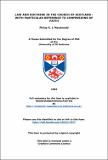Files in this item
Law and doctrine in the Church of Scotland : with particular reference to Confessions of Faith
Item metadata
| dc.contributor.advisor | Whyte, James A. | |
| dc.contributor.author | Macdonald, Finlay | |
| dc.coverage.spatial | 354 p. | en_US |
| dc.date.accessioned | 2015-07-30T08:33:48Z | |
| dc.date.available | 2015-07-30T08:33:48Z | |
| dc.date.issued | 1983 | |
| dc.identifier | uk.bl.ethos.654730 | |
| dc.identifier.uri | https://hdl.handle.net/10023/7077 | |
| dc.description.abstract | The starting point of this thesis was the debate in the General Assembly of Church of Scotland of 1974 which marked the culmination of a six year assessment of the Westminster Confession of Faith in the Church. The presbyteries and kirk sessions of the Church had indicated their overwhelming approval of the proposed changes, but in the end the General Assembly voted for the status quo. What struck me, as one who was present, was that many of the issues raised in the debate were not doctrinal, but legal. It would have been tempting to dismiss this as an example of legalist obstructionism, but my interest was aroused, and I decided to investigate for myself the background to some of the things being said, and in particular to explore the place of creeds and confessions within the Church o f Scotland, and to study the tensions created by their hybrid nature as doctrinal statements and constitutional documents. The question of a Church's relationship to its doctrinal standards is an important one in the field of Practical Theology. This thesis sets the current debate within the Church of Scotland against its historical background, thus enabling us to see that debate as the latest development in the Church's changing attitude towards Confessions of Faith in general and the Westminster Confession of Faith in particular. The Confession has served now as help, now as hindrance; now as guide, now as source of confusion; now as theological statement, now as constitutional document. The whole question of the relationship between law and doctrine in the Church is a large one. In this thesis I have made a special study of one contemporary and important aspect of the question by considering it with particular reference to Confessions of faith. The variety of functions which the Church expects its Confession to serve raises many interesting questions for theologians and for lawyers. | en_US |
| dc.language.iso | en | en_US |
| dc.publisher | University of St Andrews | |
| dc.rights | Creative Commons Attribution-NonCommercial-NoDerivatives 4.0 International | |
| dc.rights.uri | http://creativecommons.org/licenses/by-nc-nd/4.0/ | |
| dc.subject.lcc | BX9174.M2 | |
| dc.subject.lcsh | Church of Scotland | en_US |
| dc.title | Law and doctrine in the Church of Scotland : with particular reference to Confessions of Faith | en_US |
| dc.type | Thesis | en_US |
| dc.type.qualificationlevel | Doctoral | en_US |
| dc.type.qualificationname | PhD Doctor of Philosophy | en_US |
| dc.publisher.institution | The University of St Andrews | en_US |
This item appears in the following Collection(s)
Except where otherwise noted within the work, this item's licence for re-use is described as Creative Commons Attribution-NonCommercial-NoDerivatives 4.0 International
Items in the St Andrews Research Repository are protected by copyright, with all rights reserved, unless otherwise indicated.


